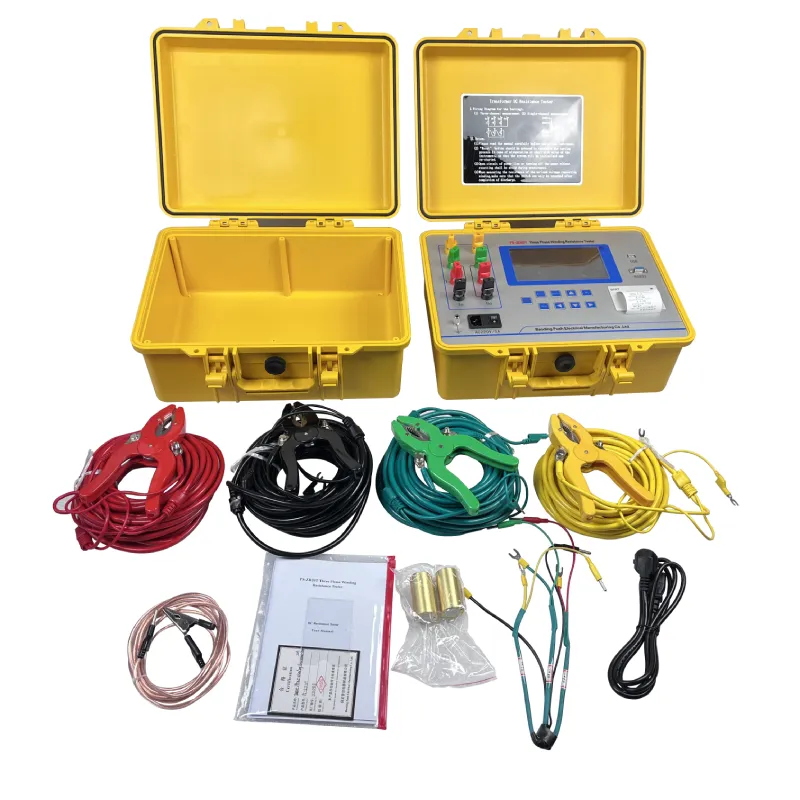 English
English


Reliable PV Insulation Testing Solutions for Solar Energy Systems and Safety Assurance
Understanding PV Insulation Testers Ensuring the Safety and Efficiency of Solar Power Systems
As the world increasingly turns to renewable energy sources, solar power has emerged as a frontrunner in the quest for sustainable alternatives. With the growing number of photovoltaic (PV) installations, ensuring their safety and efficiency has become paramount. One key aspect of maintaining the integrity of solar systems is the use of PV insulation testers. This article explores the importance of PV insulation testers, their functioning, and best practices for their use.
What is a PV Insulation Tester?
A PV insulation tester is a specialized device designed to measure the insulation resistance of photovoltaic systems. This is essential because the safety and performance of solar modules depend on the integrity of their insulation. Over time, factors such as moisture, environmental pollution, and physical wear can degrade insulation, leading to potential failures, electrical hazards, and significant reductions in energy output.
The primary function of a PV insulation tester is to apply a high voltage to the solar panels and measure the resistance of the insulation. The test typically determines whether the insulation is functioning correctly and can safely handle the operational stresses of the system.
Why Is Insulation Testing Important?
1. Safety Faulty insulation can lead to electrical shocks or fires, posing serious risks to both individuals and property. Regular testing ensures that the system is safe for operation and reduces the likelihood of accidents.
2. Performance Optimization Degraded insulation can lead to energy losses, affecting overall system efficiency. By identifying and addressing insulation issues early, operators can maintain optimal performance and energy output.
3. Compliance with Standards Many countries have stringent regulations governing renewable energy systems. Regular insulation testing ensures compliance with these standards, helping avoid legal penalties and promoting safe practices.
4. Prolonged Lifespan of Equipment By regularly testing insulation, potential problems can be detected and corrected early, extending the lifespan of the solar panels and associated equipment.
How Does a PV Insulation Tester Work?
pv insulation tester

PV insulation testers function by applying a specific voltage—often at levels such as 250V, 500V, or 1000V—to the PV modules and measuring the resultant current flow. The resistance is then calculated based on the voltage applied and the current measured.
Typically, a high insulation resistance value, usually above 1 MΩ, is indicative of effective insulation. Values below this threshold may indicate potential issues that require attention. The testers often have features for conducting both insulation resistance tests and earth continuity tests, enhancing their versatility.
Best Practices for Using PV Insulation Testers
1. Calibration and Maintenance Ensure that the insulation tester is properly calibrated before testing. Regular maintenance also prolongs the reliability and accuracy of the device.
2. Seasonal Testing Conduct insulation tests at least once a year, or more frequently in harsh environments. Seasonal testing can help identify issues due to changing temperatures and weather conditions.
3. Follow Manufacturer Guidelines Different PV systems and components may require specific testing protocols. Adhering to the manufacturer's recommendations ensures accurate results and system safety.
4. Document Results Keep thorough records of insulation tests, including voltage levels, resistance values, and any corrective actions taken. This documentation can be invaluable for compliance and future reference.
5. Professional Training Ensure that personnel conducting the tests are adequately trained and familiar with safety protocols, the functioning of the tester, and troubleshooting techniques.
Conclusion
As the adoption of solar energy continues to grow, the significance of maintaining safe and efficient PV systems cannot be overstated. PV insulation testers play a crucial role in this maintenance by ensuring that insulation integrity is preserved, thereby supporting overall safety, performance, and compliance within the renewable energy sector. Regular testing, combined with best practices and professional oversight, can secure the long-term viability of solar installations, ultimately contributing to a sustainable energy future.
-
Differences between open cup flash point tester and closed cup flash point testerNewsOct.31,2024
-
The Reliable Load Tap ChangerNewsOct.23,2024
-
The Essential Guide to Hipot TestersNewsOct.23,2024
-
The Digital Insulation TesterNewsOct.23,2024
-
The Best Earth Loop Impedance Tester for SaleNewsOct.23,2024
-
Tan Delta Tester--The Essential Tool for Electrical Insulation TestingNewsOct.23,2024





